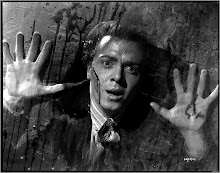Friday, 26 February 2010
Reading Journal No. 6
Homework from 26th Feb
Friday, 12 February 2010
Assessment Objectives for Unit 1 Section C (Prose) (BR and ACO)
AO1
Articulate creative, informed and relevant responses to
literary texts, using appropriate terminology and concepts,
and coherent, accurate written expression (15 marks)
AO2
Demonstrate detailed critical understanding in analysing
ways in which structure, form and language shape meanings
in literary texts (25 marks)
The first thing you might notice is that there is no requirement for comparison. (AO3 is missing - this is assessed in the poetry section). This means firstly that BR has to be the main, core text and the one you focus on throughout. ACO is then brought in to back up your points. As the exam board say, 'You should focus on your core text to establish an argument and refer to your further text to develop your line of argument.'
Obviously we will look at ways of doing this over the next 2 months.
So, as you read BR keep in mind 3 important things:
- You must analyse the language, structure (how it is organised) and form (it's a novel, a novel of action but also of ideas and at the same time a thriller! - how does all this affect the reader)...
- Keep making links to ACO
- Consider the themes and possible exam questions (you've seen some already so you can have an idea what might come up).
Comparing the openings of Brighton Rock and ACO (homework from Fri 12th Feb)
Now compare how both books begin: ACO (first 54pages) and BR (first 40 pages).
You should see this as a mini essay and whilst it won't be graded it will be marked. Divide your
1 - The language of both books (you might want to use P-E-E-L)
2 - The central characters, Pinkie and Alex.
3 - The themes that are raised e.g. Morality and Violence.
Thursday, 4 February 2010
Homework for Friday 5th Feb

Based on your reading of the first two parts of Brighton Rock, make notes and answer the following questions. The 200 words and the comparison grid are what I will expect to see next Thursday!
Read the following and make brief notes:
How does Greene present Brighton to the reader? Does it seem, already, to have any close or necessary association with the events narrated? (We know the novel is called Brighton but do not yet know if this has any significance other than what is obvious, i.e. that Brighton, as a famous seaside resort, is associated with sticks of rock in the popular imagination.) The rock has the words Brighton Rock running the whole way through, so that where you bite into it the name is still there. The significance of this is hinted at later in the novel. Can you think why this might be important? Might this have a symbolic meaning?
What have we learned about the characters of Pinkie and of Ida in this part of the novel?
The novel is narrated in the third person but the narrative viewpoint is not neutral or objective; we see things usually as they appear to Pinkie or Ida, although the first chapter is narrated very much as events appear to Hale. In what ways does Greene achieve this?
A more general idea to consider is the novelist's choice of subject; given that any story could be told, why this one? Behind this question (impossible to answer certainly) lie many other questions: is the novelist merely documenting typical events naturalistically (what you mean when you say realistically) or is he trying to interpret/ make sense of the world by means of fiction? Is the novel written for a didactic purpose (that is to teach some moral or philosophical view)? On the surface, Brighton Rock looks like a fast-paced crime thriller, and it was a best-selling novel when it first appeared, so why is it considered a "modern classic" and worthy of close study by people like yourselves? What is the relationship between places in fiction and real places? Brighton, here, is, arguably, as much a state of mind as a real place with streets and houses, even though Greene makes several precise references to the topography (layout) of the real town. Compare how Brighton is presented with the setting of A Clockwork Orange.
Write 200 words on the following:
Consider the character of Pinkie. When discussing A Clockwork Orange, it might be possible to argue that Alex is a product of the society that he lives in. To what extent can this be said of Pinkie in Brighton Rock?
Create a comparison grid (split the page down the middle with book on one side and film on the other) on the following:
Compare the opening of Brighton Rock (the book) with the film. You can find the first 10 minutes in a previous post. Search for it on the side bar to the right. It is in Blog Archive under November 2009.
